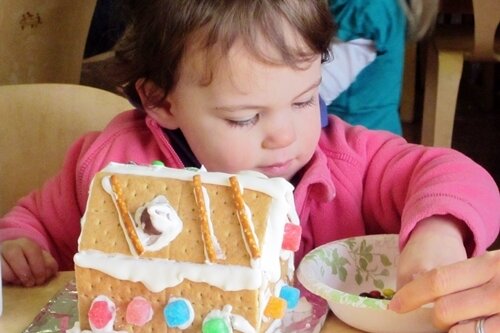
The Holidays
Ah, the season is already upon us. Montessori practitioners can at times rightly be accused of ambivalence toward the holidays. Perhaps that can be said of a lot of us, when our local department stores are already festooned in Christmas regalia before we’ve even cleared the Halloween hurdle. It can be hard to reconcile the true meaning of holidays with the fatigue induced by the marketing juggernaut that bombards us from every TV, radio, billboard, and store display.
Montessori teachers are so diligent in preparing the classroom for the children, ever mindful of the young child’s absorbent mind which assimilates everything in her environment, without discrimination. We know, too, that Dr. Montessori identified the 3 to 6-year-old child as being in the special period for the construction of the imagination. Montessori recognized that the young child is taking in vast amounts of information and experiences and is constructing not only an understanding of her world, but also the capacity for abstract thought. Imagination—the capacity to hold in the mind an image of what is, or what may be—is linked with exploration, the arts, science, mathematics, and is central to human progress and innovation.
Dr. Montessori did not denounce imaginary play—far from it. She recognized pretend play as an essential expression of the early stage of development of the imagination, which prepares the older child and adult to think abstractly. What she did not support was the cultivation of imagination alone without the underpinning of real, purposeful experiences from which the young child can form accurate impressions and an understanding of her world. The young child naturally believes what trusted adults tell her. Montessori asserted the child’s natural credulity should not be prolonged for adults’ amusement: “Education should not be directed to credulity but to independence. He who bases education on credulity builds upon sand.”
What, then, do we do with Santa Claus? How do Montessori classrooms maintain a developmentally supportive environment grounded in real-life experiences while simultaneously acknowledging and honoring the many different cultures and beliefs represented in their community, without taking advantage of children’s credulity?
The marking of special occasions and the seasons is a universal human experience, rooted in culture. In our school, they are recognized in many ways. Some are quite subtle, some more overt. When the Smelling Jars are refreshed in late autumn with new scents to explore, they may be filled with wintergreen, clove, cinnamon, and citrus. Library books appear on the bookshelf with seasonal significance. Mandarin oranges and cloves may appear on the Practical Life shelves for the creation of pomander balls. Cultural folders or language cards might include photographs of holiday celebrations from around the world. Songs, stories, and poetry provide engaging language experiences—the Primary and Elementary children sing with gusto in the weeks leading up to our annual Holiday Sing-Along in December. The Primary children may Walk on the Line expressively to Tchaikovsky’s Nutcracker Suite. The Upper Elementary children host Winterfest, a celebration for decorating gingerbread houses, drinking cocoa, and building the perfect holiday wreath.
Some of us love the holidays, and for some of us, the season is loaded with baggage. What we don’t do here is suppress the children when they bring up Christmas, Santa Claus, Hanukkah, Diwali, or anything which is of cultural importance or sparking their curiosity. What a great opportunity to create classroom rituals; tell true stories; learn new songs; taste special foods; invite parents in to celebrate St. Lucia, light the Yule candle, or play dreidl;or taking out the Puzzle Maps or a book and explore the areas of the world from which holiday traditions originate. By doing so, the children learn an appreciation for culture—that of their family, their classroom, their greater community, and of those far away. They also learn that though we may celebrate different things in different ways, it is a fundamental part of being human.
Here is a great blog post from Montessori Northwest about how to approach holidays in a Montessori context.
